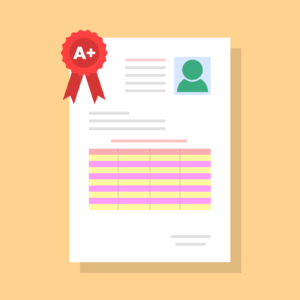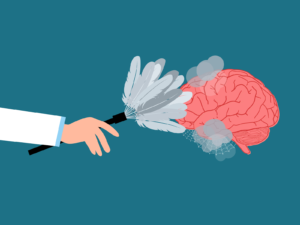
We’ve all been there—staring down the barrel of a comprehensive exam, feeling like the weight of the world is resting squarely on our shoulders. It’s the kind of stress that makes your palms sweat and your heart race, and it’s completely normal. But what if I told you that the very stress you’re feeling can actually be turned into a powerful tool for success? Sounds crazy, right? But stay with me.
Comprehensive exams are often the final hurdle between you and that coveted degree. They’re meant to test everything you’ve learned, pushing you to synthesize vast amounts of information and demonstrate mastery of your field. No pressure, right? The reality is that the pressure is real, and it’s intense. But here’s the good news: exam anxiety, when managed correctly, can be your secret weapon.
In this blog, I’m going to take you through some proven techniques that not only help you survive the stress of comprehensive exams but actually use that stress to your advantage. We’ll dive into the mindset shifts that can turn anxiety into motivation, explore study strategies that are tailor-made for high-pressure situations, and look at stress management techniques that keep your body and mind in peak condition. Whether you’re just starting your preparation or deep in the trenches, these tips are designed to help you not just pass your exams but ace them.
So, take a deep breath, grab a warm beverage, and let’s turn that stress into success together. By the end of this post, you’ll be armed with a toolkit of strategies that will make you feel not only prepared but confident in the face of your comprehensive exams. Let’s get started.
1. Understanding the Nature of Comprehensive Exams

Before we can talk about turning stress into success, it is important to understand exactly what you are up against in the comprehensive exam. These exams are a rite of passage in many graduate and PhD programs, designed to test your mastery of the subject matter and your ability to integrate and apply what you’ve learned throughout your studies. They are not just any test but a big deal. But what makes them so challenging?
What Are Comprehensive Exams?
Comprehensive exams, often referred to as “comps” or “quals,” vary widely depending on your field of study and the institution you attend. Generally, they are designed to evaluate your grasp of the core material in your discipline, ensuring you are ready to move on to the next stage in your dissertation work. According to Keenan and Stewart-Wells (2021), comprehensive exams typically serve as a gatekeeping mechanism, allowing students to demonstrate their readiness for advanced research before they can dive into qualitative or quantitative research aspects of the dissertation. These exams can take several forms: written tests, oral defenses, or even a combination of both. For example, in many Ph.D. programs, you might face a grueling written exam followed by an oral examination where you defend your responses before a panel of experts.
Why They’re Stressful
There’s no sugarcoating it; comprehensive exams can be stressful. And it’s not just because of the sheer volume of material you’re expected to know. The stakes are high—failing can mean delays in your academic progress, additional work, or, in some cases, the end of your journey in the program. One reason these exams are so stressful is the uncertainty surrounding them. Comps are more open-ended. You’re expected to not only know the material but also to demonstrate a deep understanding and ability to apply that knowledge. This ambiguity is a significant stressor for many students, as noted by Safarzaie et al. (2017) in their study on stress in graduate education, where they found that the unpredictability of exam content can significantly heighten stress levels.
Additionally, the format itself can be daunting. The oral component, in particular, is often cited as one of the most nerve-wracking experiences. Imagine standing in front of a panel of your professors, who are experts in your field, and having to articulate complex statistical analysis concepts on the spot. The pressure to perform well in such a high-stakes environment can be overwhelming, as highlighted by Safarzaie et al. (2017). Moreover, the nature of comprehensive exams requires a different approach to studying compared to other types of exams. Instead of focusing on memorization, you need to develop a deep understanding and the ability to synthesize information across different areas of your discipline. This type of cognitive work is more demanding and can add to the stress, especially when you’re not sure you’re covering all the right bases.
2. Mindset Shifts: Turning Stress into a Positive Force

Stress is often painted as the villain in the story of academic life, but what if stress could be your secret weapon? The way you perceive and handle stress can make a world of difference in how you perform in high-pressure situations like comprehensive exams. By shifting your mindset, you can transform stress from a debilitating force into a powerful motivator that drives you toward success.
Reframing Stress as a Motivator
The idea that stress is inherently bad is a common misconception. While chronic, unmanaged stress can certainly be harmful, the right kind of stress, known as “eustress,” can actually enhance performance. According to Selye’s (1974) General Adaptation Syndrome theory, eustress is the positive form of stress that energizes you and enhances your cognitive function, which can be particularly beneficial during exam preparation. When you start to feel the pressure during the comprehensive exams, instead of viewing it as a threat, try to reframe it as a challenge.
This shift in perspective can significantly alter your physiological response to stress. Research by McGonigal (2016) shows that when individuals perceive stress as a positive force, they experience improved focus, heightened energy levels, and better overall performance. This mindset shift allows you to harness the adrenaline rush that comes with stress, using it to sharpen your concentration and fuel your productivity. If you find yourself struggling with this, seeking dissertation help or consulting with a dissertation consultant can provide the guidance needed to navigate these challenges more effectively.
One practical way to reframe stress is through the use of positive affirmations. When you catch yourself spiraling into negative thoughts like “I can’t do this” or “I’m not prepared enough,” replace them with affirmations like “I’m capable and ready to tackle this challenge” or “This stress is pushing me to perform at my best.” By consciously altering your inner dialogue, you can change how your body responds to stress, turning anxiety into excitement and readiness.
Building Resilience
Another crucial aspect of managing stress is building resilience—the ability to bounce back from setbacks and continue moving forward. Resilience isn’t just about toughness; it’s about flexibility and adaptability. According to Bonanno (2004), resilient individuals are better equipped to handle stress because they see challenges as opportunities for growth rather than insurmountable obstacles. Cultivating a growth mindset is a key component of resilience.
growth mindset is the belief that your abilities and intelligence can be developed through hard work, dedication, and learning from mistakes. This perspective is particularly powerful in the context of comprehensive exams, where the sheer volume of material and the complexity of questions can feel overwhelming. Instead of fearing failure, a growth mindset encourages you to view difficult questions as chances to deepen your understanding and improve your skills. For those who need extra support, seeking dissertation consulting can be a valuable resource in fostering this mindset and ensuring you’re on the right track.
Resilience also involves learning how to recover from setbacks quickly. This might mean taking a short break after a particularly tough study session, practicing mindfulness to regain your focus, or talking through your frustrations with a peer or mentor. The key is not to let a momentary setback derail your entire preparation process. As Southwick and Charney (2018) explain, resilience is about maintaining a steady course, even when the waters get rough.
Finally, resilience is bolstered by a strong support system. Surrounding yourself with people who believe in you and encourage your growth can make a significant difference in how you handle stress. Whether it’s a study buddy or a mentor, having people who can provide perspective and emotional support is invaluable during the intense preparation for comprehensive exams.
3. Effective Study Strategies for Comprehensive Exams

Preparing for comprehensive exams requires more than just hard work; it demands strategic planning and efficient study techniques. With the sheer volume of material you need to cover, it’s easy to feel overwhelmed. But with the right approach, you can turn this monumental task into a manageable and even rewarding experience. Let’s explore some proven study strategies that will help you prepare effectively and maximize your chances of success.
Creating a Study Plan
One of the first steps in preparing for your comprehensive exams is to create a study plan. A well-organized plan is essential because it allows you to break down the massive amount of material into manageable chunks and ensures that you cover all the necessary content without feeling rushed. If you’re finding it difficult to organize your plan, a dissertation coach can provide invaluable guidance in structuring your study approach. According to Zimmerman and Schunk (2013), setting specific goals and creating a structured timeline can significantly enhance your learning efficiency and reduce anxiety.
Start by mapping out the topics you need to cover, then allocate time to each based on its difficulty and importance. Be realistic about your schedule—factor in time for review, self-testing, and breaks. Remember, consistency is key, so it’s better to study regularly for shorter periods than to cram everything into long, exhausting sessions. Moreover, flexibility in your plan is crucial. Life happens, and sometimes, you may need to adjust your schedule to even pull a late night once in a while. The ability to adapt your study plan without losing momentum is a critical skill that will serve you well not just in your exams but in your academic and professional life.
Active Learning Techniques
Once your study plan is in place, focus on active learning techniques. Passive methods like reading or highlighting text can be helpful, but they often lead to superficial understanding and poor retention. Instead, engage with the material actively; this means doing something with the information rather than just taking it in.
Research shows that active learning strategies such as summarization, teaching others, and self-testing are significantly more effective in promoting deep understanding and long-term retention of information. For instance, summarizing what you’ve learned in your own words forces you to process the material more deeply and identify areas where your understanding might be lacking. Similarly, teaching the material to someone else—whether it’s a peer, a friend, or even an imaginary audience—can reinforce your knowledge and highlight any gaps. Dissertation consulting services can offer insights into effective active learning strategies tailored to your specific field of study.
Another powerful active learning technique is the use of practice exams and mock presentations. Roediger and Butler (2011) found that frequent testing not only helps consolidate information but also reduces test anxiety by familiarizing you with the exam format and types of questions you might encounter. Create practice questions or use available resources to simulate exam conditions. This will help you get used to the pressure of the real thing and improve your ability to recall and apply knowledge under timed conditions.
Utilizing Memory Aids
Memory aids, such as flashcards, concept maps, and mnemonic devices, are invaluable tools when preparing for comprehensive exams. These tools help you organize information in a way that makes it easier to recall and apply during your exams. Flashcards are particularly effective for memorizing key terms, concepts, and definitions. The act of creating flashcards is itself a form of active learning, as it requires you to distill information into its most essential elements.
According to Karpicke and Blunt (2011), the retrieval practice associated with using flashcards significantly enhances long-term retention compared to simple review or rereading. Concept maps, on the other hand, are great for visual learners and those trying to understand the alignment between different concepts. By laying out the information in a visual format, you can see how various ideas connect, making it easier to understand and remember complex material. Creating a concept map forces you to think critically about how different pieces of information fit together, which can deepen your understanding of the subject matter.
Collaborative Study
While studying alone has its advantages, collaborative study with a study buddy can offer unique benefits that are especially valuable during comprehensive exam preparation. Working with others allows you to share resources, gain new perspectives, and test your knowledge in a group setting. You can opt for virtual tutoring and coaching from dissertation consultants on how to gain more from collaborative learning. Johnson et al. (1998) highlight that collaborative learning not only improves academic performance but also increases retention and fosters a deeper understanding of the material.
When you study with others, you can clarify doubts, discuss difficult concepts, and challenge each other with questions. This interaction helps solidify your understanding and exposes you to different ways of thinking about the material. However, effective collaboration requires the right group dynamics. Choose study partners who are committed, focused, and respectful of each other’s learning styles and time. Set clear goals for each study session and ensure that everyone contributes. This way, you can make the most of your time together and support each other in the journey toward acing your comprehensive exams.
4. Stress Management Techniques

Preparing for comprehensive exams is an intense process, and managing the accompanying stress is crucial to maintaining your focus, well-being, and overall performance. While a certain level of stress can be motivating, too much can hinder your ability to concentrate, recall information, and stay healthy. This section explores effective stress management techniques that can help you stay balanced and perform at your best during exam preparation.
Physical Well-being
Your body and mind are closely connected, and physical health plays a vital role in managing stress. Regular exercise, adequate sleep, and proper nutrition are foundational to keeping stress in check.
 Exercise: Exercise is one of the most effective ways to reduce stress and improve mental health. Physical activity stimulates the production of endorphins, the body’s natural mood elevators. According to Salmon (2001), regular aerobic exercise can reduce anxiety and depression and improve overall mood. Even something as simple as a brisk walk or a short yoga session can make a big difference. Exercise not only helps to clear your mind but also improves your energy levels and cognitive function, making it easier to focus during study sessions—especially when you’re tackling complex tasks like statistical analysis or qualitative analysis as part of your dissertation.
Exercise: Exercise is one of the most effective ways to reduce stress and improve mental health. Physical activity stimulates the production of endorphins, the body’s natural mood elevators. According to Salmon (2001), regular aerobic exercise can reduce anxiety and depression and improve overall mood. Even something as simple as a brisk walk or a short yoga session can make a big difference. Exercise not only helps to clear your mind but also improves your energy levels and cognitive function, making it easier to focus during study sessions—especially when you’re tackling complex tasks like statistical analysis or qualitative analysis as part of your dissertation.
Sleep: Sleep is another critical component of stress management. The temptation to pull numerous all-nighters might be strong as exams approach, but sacrificing sleep is counterproductive. Research by Walker (2017) shows that sleep is essential for memory consolidation, problem-solving, and emotional regulation—key elements of exam success. Aim for 7-9 hours of quality sleep per night, and try to maintain a consistent sleep schedule. Poor sleep habits can exacerbate stress and diminish your ability to retain information.
 Nutrition: Nutrition also plays a significant role in managing stress. A balanced diet that includes a variety of fruits, vegetables, lean proteins, and whole grains provides the nutrients your brain needs to function optimally to ace the comprehensive exams. According to Gómez-Pinilla (2008), certain foods, like those rich in omega-3 fatty acids, antioxidants, and vitamins, can improve cognitive function and protect against the negative effects of stress. Avoid excessive caffeine and sugar, which can lead to energy crashes and increased anxiety.
Nutrition: Nutrition also plays a significant role in managing stress. A balanced diet that includes a variety of fruits, vegetables, lean proteins, and whole grains provides the nutrients your brain needs to function optimally to ace the comprehensive exams. According to Gómez-Pinilla (2008), certain foods, like those rich in omega-3 fatty acids, antioxidants, and vitamins, can improve cognitive function and protect against the negative effects of stress. Avoid excessive caffeine and sugar, which can lead to energy crashes and increased anxiety.
Mental Well-being
In addition to taking care of your body, it’s essential to focus on your mental well-being. Techniques such as mindfulness, meditation, and Cognitive Behavioral Therapy (CBT) can help you manage the mental and emotional aspects of stress.
Mindfulness: Mindfulness involves staying present and fully engaging with the current moment. This practice can be particularly helpful when you feel overwhelmed by the amount of material you need to cover. Kabat-Zinn (2023), a pioneer in the field of mindfulness, explains that mindfulness can reduce stress by helping you stay grounded and focused rather than getting lost in worries about the future or regrets about the past. Simple mindfulness exercises, such as paying attention to your breath or practicing mindful eating, can be incorporated into your daily routine to reduce stress and enhance concentration.
Meditation: Meditation is another powerful tool for managing stress. Regular meditation practice has been shown to reduce anxiety and increase resilience to stress. A study by Zeidan et al. (2010) found that even brief meditation sessions can improve mood and cognitive function, making it easier to focus and retain information during study sessions. There are many types of meditation, but a simple technique is to sit quietly and focus on your breathing for a few minutes each day. Over time, this practice can help you develop a calm and focused mind, which is invaluable during exam preparation.
Cognitive Behavioral Therapy (CBT) techniques can also be highly effective in managing the thoughts and beliefs that contribute to stress. CBT helps you identify and challenge negative thought patterns, replacing them with more positive and realistic ones. According to Beck (2020), by addressing the cognitive distortions that often accompany stress, such as catastrophizing or all-or-nothing thinking, you can reduce anxiety and build a more resilient mindset. For example, instead of thinking, “I’ll never be able to cover all this material,” CBT encourages you to reframe it as “I can make a solid effort to cover the most important topics.”
Time Management

Time management is a crucial aspect of stress management, especially when preparing for comprehensive exams. Effective time management helps prevent the build-up of stress by ensuring that you stay on track and don’t fall behind in your studies. One useful technique is the Pomodoro Technique, which involves working in focused intervals (usually 25 minutes) followed by a short break. This method helps maintain concentration and prevents burnout, breaking your study time into manageable chunks.
Research by Almalki et al. (2020), developer of the Pomodoro Technique, suggests that this approach can improve focus and productivity, which in turn reduces stress by making your study sessions more efficient. Another important aspect of time management is knowing when to take breaks and relax. Continuous studying without breaks can lead to mental fatigue, which diminishes your ability to learn and retain information. Brown and Ryan (2003) highlight that taking regular breaks not only reduces stress but also enhances creativity and problem-solving abilities, making your study time more effective overall. Use breaks to step away from your desk, stretch, or do something enjoyable, like listening to music or going for a short walk. These breaks will help you return to your studies refreshed and more focused.
5. Test Day Strategies

The day of your comprehensive exams has finally arrived. After weeks or even months of preparation, it all comes down to this. While the pressure is undoubtedly high, having a clear plan for test day can help you manage your nerves, stay focused, and perform at your best. This section offers practical strategies to help you navigate the challenges of test day with confidence and composure.
Preparation in the Final Week
In the final week leading up to your comprehensive exams, your focus should shift from learning new material to reinforcing what you already know. This period is crucial for solidifying your knowledge and ensuring that you’re mentally and physically ready for the exam.
Review and Synthesize: During this final week, concentrate on reviewing key concepts and synthesizing the material you’ve studied. According to Dunlosky et al. (2013), active recall and spaced repetition are highly effective for strengthening memory and ensuring that information is readily accessible during the exam. Instead of cramming new information, revisit your summaries, flashcards, and concept maps. Practice retrieval by testing yourself on key topics and focusing on understanding rather than memorization.
Avoid Last-Minute Cramming: While it might be tempting to squeeze in as much studying as possible, last-minute cramming can actually be detrimental. Research by Rohrer and Pashler (2007) suggests that cramming leads to short-term retention but hinders long-term memory and understanding, which are essential for comprehensive exams. Instead, aim to review the most critical material in a calm and deliberate manner. This approach will help reduce anxiety and prevent burnout. You can work with a dissertation coach to help you prioritize your review sessions, ensuring you’re focusing on the most important areas.
Relaxation and Mental Preparation: In the days leading up to the exam, prioritize relaxation and mental preparation. Rohrer and Pashler (2007) emphasize the importance of stress reduction techniques, such as mindfulness and deep breathing, to help calm your mind and improve focus. Engage in activities that help you relax, such as meditation, light exercise, or spending time with friends and family. Visualization is another powerful tool—imagine yourself succeeding on the exam, calmly answering questions, and feeling confident in your knowledge.
On the Day of the Exam
 When test day arrives, it’s natural to feel nervous, but with the right strategies, you can manage your anxiety and perform to the best of your ability. The night before the exam, ensure you get a full night’s sleep. Walker (2017) stresses that adequate sleep is crucial for memory consolidation and cognitive performance, making it one of the most important factors for exam success. Avoid staying up late to study—your brain needs time to rest and process the information you’ve learned.
When test day arrives, it’s natural to feel nervous, but with the right strategies, you can manage your anxiety and perform to the best of your ability. The night before the exam, ensure you get a full night’s sleep. Walker (2017) stresses that adequate sleep is crucial for memory consolidation and cognitive performance, making it one of the most important factors for exam success. Avoid staying up late to study—your brain needs time to rest and process the information you’ve learned.
On the morning of the exam, eat a nutritious breakfast that includes a balance of protein, complex carbohydrates, and healthy fats. According to Gómez-Pinilla (2008), certain nutrients, like omega-3 fatty acids and antioxidants, can enhance cognitive function and help you stay focused during the exam. Avoid heavy or sugary foods that can cause energy crashes and make it harder to concentrate. Give yourself plenty of time to get to the exam location so you’re not rushed or stressed before the test begins. Bring all necessary materials—such as pens, pencils, and any permitted notes or resources—and double-check that you have everything before you leave home.
Once the exam begins, time management is key. Start by quickly reviewing the entire exam to understand the questions and allocate your time accordingly. Kabat-Zinn (2023) suggests that effective time management during exams can significantly improve performance, as it allows you to prioritize questions and avoid spending too much time on any one section. If you encounter a difficult question, don’t panic. Skip it and move on to the next one, returning to it later if time permits. This strategy helps you maintain momentum and prevents you from getting stuck and losing valuable time.
During the exam, it’s normal to feel moments of anxiety, but it’s important to stay calm and focused. Use deep breathing techniques to regulate your stress levels. Roediger and Butler (2011) found that deep breathing can activate the parasympathetic nervous system, reducing anxiety and improving cognitive function under pressure. If you start to feel overwhelmed, take a brief pause, close your eyes, and take a few deep breaths to reset. Remember, confidence is key. Trust in the preparation you’ve done and the knowledge you’ve gained. Positive self-talk can also be incredibly powerful—remind yourself that you’re capable, prepared, and ready to tackle the exam.
After the Exam

Once the exam is over, it’s important to take care of yourself, regardless of how you think you performed. After the exam, take some time to reflect on your performance, but don’t dwell on it. Seligman (2006) recommends focusing on what went well and learning from the experience rather than ruminating on perceived mistakes. This positive reflection can help you build resilience for future challenges. Regardless of the outcome, celebrate the hard work and dedication you put into preparing for your comprehensive exams. Acknowledge your effort and reward yourself with something you enjoy.
Conclusion
As you stand at the finish line of your comprehensive exam preparation, it’s crucial to recognize that the journey you’ve undertaken is just as important as the destination. The process of preparing for and taking comprehensive exams is not merely a test of your knowledge; it’s a test of your resilience, discipline, and ability to manage stress. The knowledge, skills, and strategies you’ve developed during your preparation have equipped you to succeed. While inevitable, stress is something you can manage and use to your advantage.
Seligman (2006) reminds us that a positive outlook and belief in your ability to overcome challenges are key to not just surviving stressful situations but thriving in them. It’s important to give yourself credit for the effort you’ve put in. Comprehensive exams are demanding, but you’ve met the challenge with determination and resilience. Trust in the process, and believe in your ability to navigate this final hurdle. Whether you pass with flying colors or face some setbacks, remember that this experience is just one part of your larger journey, one that has prepared you for the complexities of both academic and professional life.
Now that you’re armed with these strategies, it’s time to put them into practice. Approach your comprehensive exams with the confidence that comes from knowing you’ve prepared thoroughly and strategically. Apply the mindset shifts and stress management techniques we’ve discussed, and use your study time effectively in the days leading up to the exam. If you need additional support as you progress in your academic career, consider seeking a dissertation consultant like Precision Consulting. These professionals offer a range of dissertation services and provide dissertation help and comprehensive exam assistance tailored to your specific needs. Remember that comprehensive exams are a challenge, but they are also an opportunity—a chance to demonstrate your knowledge, resilience, and growth. With the right mindset and strategies, you can not only face this challenge but excel. Good luck, and trust in your ability to succeed.
References
Almalki, K., Alharbi, O., Al-Ahmadi, W., & Aljohani, M. (2020). Anti-procrastination Online Tool for Graduate Students Based on the Pomodoro Technique. In P. Zaphiris & A. Ioannou (Eds.), Learning and Collaboration Technologies. Human and Technology Ecosystems (pp. 133–144). Springer International Publishing. https://doi.org/10.1007/978-3-030-50506-6_10
Beck, J. S. (2020). Cognitive Behavior Therapy, Third Edition: Basics and Beyond. Guilford Publications.
Bonanno, G. A. (2004). Loss, Trauma, and Human Resilience: Have We Underestimated the Human Capacity to Thrive After Extremely Aversive Events? American Psychologist, 59(1), 20–28. https://doi.org/10.1037/0003-066X.59.1.20
Brown, K. W., & Ryan, R. M. (2003). The benefits of being present: Mindfulness and its role in psychological well-being. Journal of Personality and Social Psychology, 84(4), 822–848. https://doi.org/10.1037/0022-3514.84.4.822
Dunlosky, J., Rawson, K. A., Marsh, E. J., Nathan, M. J., & Willingham, D. T. (2013). Improving Students’ Learning With Effective Learning Techniques: Promising Directions From Cognitive and Educational Psychology. Psychological Science in the Public Interest, 14(1), 4–58. https://doi.org/10.1177/1529100612453266
Gómez-Pinilla, F. (2008). Brain foods: The effects of nutrients on brain function. Nature Reviews Neuroscience, 9(7), 568–578. https://doi.org/10.1038/nrn2421
Johnson, D. W., Johnson, R. T., & Smith, K. A. (1998). Cooperative Learning Returns To College What Evidence Is There That It Works? Change: The Magazine of Higher Learning. https://doi.org/10.1080/00091389809602629
Kabat-Zinn, J. (2023). Wherever you go, there you are: Mindfulness meditation in everyday life. Hachette UK.
Karpicke, J. D., & Blunt, J. R. (2011). Retrieval Practice Produces More Learning than Elaborative Studying with Concept Mapping. Science, 331(6018), 772–775. https://doi.org/10.1126/science.1199327
Keenan, K. M., & Stewart-Wells, A. G. (2021). Moving Beyond Comprehensive Exams: Implementing Authentic Assessments to Enhance Doctoral Student Learning. Christian Higher Education, 20(1–2), 69–86. https://doi.org/10.1080/15363759.2020.1851815
McGonigal, K. (2016). The upside of stress: Why stress is good for you, and how to get good at it. Penguin.
Roediger, H. L., & Butler, A. C. (2011). The critical role of retrieval practice in long-term retention. Trends in Cognitive Sciences, 15(1), 20–27. https://doi.org/10.1016/j.tics.2010.09.003
Rohrer, D., & Pashler, H. (2007). Increasing Retention Without Increasing Study Time. Current Directions in Psychological Science, 16(4), 183–186. https://doi.org/10.1111/j.1467-8721.2007.00500.x
Safarzaie, H., Nastiezaie, N., & Jenaabadi, H. (2017). The Relationship of Academic Burnout and Academic Stress with Academic Self-Efficacy among Graduate Students. The New Educational Review, 49, 65–76. https://doi.org/10.15804/tner.2017.49.3.05
Salmon, P. (2001). Effects of physical exercise on anxiety, depression, and sensitivity to stress: A unifying theory. Clinical Psychology Review, 21(1), 33–61. https://doi.org/10.1016/S0272-7358(99)00032-X
Seligman, M. E. (2006). Learned optimism: How to change your mind and your life. Vintage.
Selye, H. (1974). Stress without distress. Lippincott and Crowell, Publishers.
Southwick, S. M., & Charney, D. S. (2018). Resilience: The Science of Mastering Life’s Greatest Challenges. Cambridge University Press.
Walker, M. (2017). Why We Sleep: Unlocking the Power of Sleep and Dreams. Simon and Schuster.
Zeidan, F., Johnson, S. K., Diamond, B. J., David, Z., & Goolkasian, P. (2010). Mindfulness meditation improves cognition: Evidence of brief mental training. Consciousness and Cognition, 19(2), 597–605. https://doi.org/10.1016/j.concog.2010.03.014
Zimmerman, B. J., & Schunk, D. H. (2013). Self-Regulated Learning and Academic Achievement: Theoretical Perspectives. Routledge.